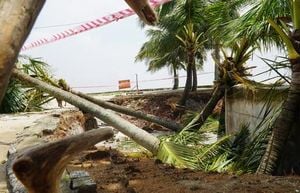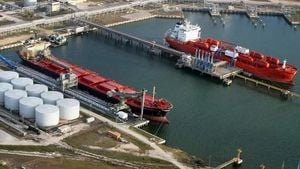The United Arab Emirates (UAE) is making headlines with the ambitious development of what is set to become the world's largest solar power and battery energy storage system, capable of providing clean electricity around the clock. Nestled within the capital city of Abu Dhabi, this groundbreaking project is the result of collaboration between the Abu Dhabi Future Energy Company, known as Masdar, and the Emirates Water and Electricity Company (EWEC).
At the heart of this extensive effort is the construction of a solar power plant boasting 5.2 gigawatts (GW) of capacity, coupled with a state-of-the-art Battery Energy Storage System (BESS) with 19 gigawatt-hours (GWh) of storage capability. Dr. Sultan Al Jaber, UAE Minister of Industry and Advanced Technology and Chairman of Masdar, articulated the most significant challenge facing renewable energy—“intermittency”—which this project aims to overcome. The initiative promises to deliver clean energy ceaselessly, both day and night.
This project will be groundbreaking, knowledgeable industry insiders note, as it marks the first time renewable energy can deliver reliable base-load power at the utility scale of 1 GW. Masdar's approach sets the bar for potential future projects across the globe, providing steady, dependable energy output unlike any seen before.
Notably, Masdar has partnered with two of the world's largest solar panel suppliers, JA Solar and Jinko Solar, to jointly provide 2.6 GW of solar panels. When it came to securing the battery technology, Masdar chose CATL, a global leader specializing in battery energy storage. For the engineering, procurement, and construction segments, Masdar selected Indian firms Larsen & Toubro and POWERCHINA, assuring operational efficiency and expertise for this monumental feat.
The expected benefits of this project extend beyond clean energy—Masdar has projected the creation of over 10,000 jobs through this initiative, showcasing its commitment to both environmental sustainability and economic development within the region. While the completion timeline for the project remains unnamed, the anticipation surrounding it already speaks to the ambitious goals set forth by those involved.
This transformative project is part of the UAE's broader push to embrace renewable energy. Previous developments include Dubai International Airport's initiative to install solar panels, generating up to 39 megawatts peak (MWp) to fulfill 6.5% of the airport's energy needs, as well as Dubai World Central – Al Maktoum International Airport which aims for 20% dependability through solar energy. These undertakings signify the UAE's steadfast commitment to advancing sustainable solutions.
The impact of this latest project could reshape perceptions of renewable energy capabilities, potentially allowing environments not previously associated with solar energy to thrive. With its ambitious objectives and groundbreaking technological applications, this initiative may serve as a turning point for energy infrastructures worldwide.
Experts believe success could not just transform the UAE's energy strategy but also spark initiatives globally as countries explore similar paths seeking sustainable energy solutions. The world will be watching closely as the UAE aims to change the solar energy game.
With growing support for renewable energy initiatives and continuous efforts to integrate innovative technologies, the UAE is well-positioned to take the lead on the international stage. By spearheading this revolutionary project, the UAE not only strives for energy independence but fulfills its responsibility as a leader in global sustainability efforts.



